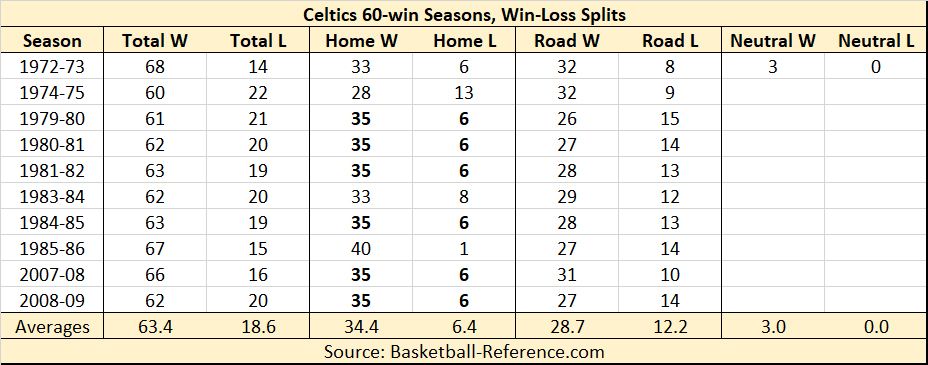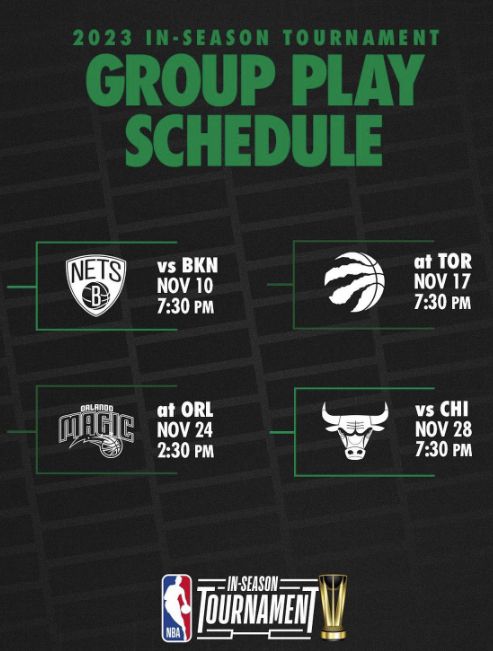Anatomy of a 60-Win Season

The NBA began playing an 82-game schedule with the 1967-1968 season. The Celtics got off to a great start with the 82-game schedule, as they won the NBA Finals in that season and the season after, as not even additional games could stop the great Bill Russell, who by that point was the player/coach.
Since and including that '67-'68 season, the NBA has played an 82-game schedule 52 times, with the exceptions being 1998-1999 and 2011-2012, which had labor conflicts, and the pandemic shortened 2019-2020 and 2020-2021 seasons. (The Celtics also only played 81 games during 2012-2013, but the rest of the league played 82). In those 52 seasons, they have won 60+ games 10 times. So, roughly 1/5th of the time. It's not bad to be a Celtics fan, ha.
Why 60 games? I think that has to be the goal for this season. Last season's team won 57 games, and it's time for the Jayson Tatum-Jaylen Brown combo to make the leap in the annals of Celtics history. Step one, a 60-win season. Step two, a championship. One will follow the other. This team is going to need to be the overall No. 1 seed, which should be achievable for two reasons – I think the East got softer, and I think the West will be a bloodbath, making it very difficult for any one team to win 60 games out West. If the Nuggets had retained Bruce Brown and Jeff Green, I might feel differently, but they didn't.
Now that the 2023-2024 NBA schedule has been released, I wanted to take a minute to think through exactly how the Celtics would go about achieving this 60-win season. Like any other season, the schedule has its challenges. Lately, the phrase "schedule loss" has entered the NBA vernacular to describe any challenging game that looks like it should be or was a loss based solely on how the schedule lined up – a back-to-back, a long road trip, etc. But before I looked forward, I wanted to look back at those 60-win seasons. Some patterns do emerge:

As you can see, in six of these 10 seasons, Boston's home record was 35-6. That's a pretty concrete pattern, so I bolded them in the chart above. Elsewhere, you see some other nuggets. For instance, the team never lost more than 15 road games in any of these seasons, and in most of these seasons, won twice as many road games as they lost (or at 27-14, were remarkably close to that mark).
That sets up a good framework from which to work. I also found it interesting that the '72-'73 team had neutral site games. I assume this was a function of either barnstorming or sharing the Garden with the Bruins, but that's a research project for another time. Why it's instructive for this season is because of the new NBA Cup (or in-season tournament). Currently, the Celtics are scheduled for only 80 of their 82 games – evenly 40 home and 40 road. Here is their schedule for group play:

In my opinion, this is looks like a 3-1 record to me, with the one game that worries me being the game in Orlando. Orlando played the C's very well last season, and the afternoon games will always worry me.
Let's assume the 3-1 record, and that gets them a top-8 record heading into the NBA Cup quarterfinals, which gives them a home game on Dec. 4th or 5th. Let's then go ahead and assume that they win that game and get into the semifinals in Las Vegas. That would make their official regular-season schedule 41 home games, 40 road games, and one neutral game.
With that out of the way, we can look at the schedule a little more closely. There are some broad takeaways.
Beware the Ides of March
Using our two assumptions from above, here's how the 82-game schedule breaks down:
- October: One home game, two road games
- November: Seven home, eight road
- December: Eight home, five road, one neutral
- January: Eight home, eight road
- February: Six home, four road
- March: Five home, ELEVEN road
- April: Six home, two road
March has not one, but two five-game road trips. Plus tough and/or emotional home games versus Dallas (Grant Williams returns), Golden State, Phoenix, and Milwaukee. If you'll pardon the crude phrase, it's a real dick punch of a month. There's a decent chance that March makes or breaks the season.
Happier Schedule Notes
It's not all bad news though. Let's look at some positives:
- Philly: Three of the four games versus Philadelphia will take place early – Nov. 8th, Nov. 15th, and Dec. 1st. If James Harden really does refuse to play until he's traded, and Philly GM Daryl Morey calls his bluff and the Sixers just play without him in the early going, that's going to make it very hard for Philly to win these initial three games. Another happy note – the C's have one day of rest before the November Philly games, and two days of rest before the Dec. 1 game. They also have two days of rest before the final game against them, a home game on Feb. 27th. I think a season sweep of Philly is on the table.
- Pre-All-Star break: The schedule heading into the All-Star break is very favorable. Starting January 27th, the C's play eight of 10 games at home, with the only road games being Miami and the close-by Brooklyn. The opponents include the Lakers and the return of Marcus Smart with Memphis (a game that I am in no way, shape, or form mentally prepared for), but every single game of the 10 is winnable.
- Season Ends Softly: After the nightmare March, the season ends with an April in which 8-0 should be on the table. It starts with a road game in Charlotte, and then two sets of three home games, with a trip to Milwaukee in the middle. The first set of three home games are against western teams – Oklahoma City, Sacramento, and Portland. The night before their dates in Boston, OKC is in Philly and Sacramento is in New York, so those could be schedule losses for them. After the Milwaukee game, the season finishes with home games vs. New York, Charlotte, and Washington. If the C's need those games, they're all winnable. If they don't, they could rest guys and the reserves might still win anyway.
Second Nights of Back to Backs
These games will be flashpoints because it's unlikely Al Horford will play in them. I think once last season the C's had him sit out the front end of a back-to-back, but the general routine was for him to sit out the second game. There are 14 such games this season. Here they are:
- Nov. 11th vs. TOR
- Nov. 20th at cha
- Dec. 15th vs. ORL
- Dec. 20th at sac
- Dec. 29th vs. TOR
- Jan. 6th at ind
- Jan. 11th at mil
- Jan. 22 at dal
- Jan. 30 vs. IND
- Feb. 14 vs. BKN
- Mar. 12 at uta
- March 18 vs. DET
- March 23 vs. CHI
- Apr. 12th vs. CHA
The news could be a lot worse. Eight of the 14 are at home. Look at that opponent list again. How many title contenders? I think you can make credible cases for Milwaukee and Sacramento, but you have to squint real hard to see it for anyone else.
What's more, Horford isn't as needed or can be run off the floor against a few of these teams that don't really play imposing, hulking centers – Charlotte, Sacramento, Indiana, Dallas, and Brooklyn among them. Toronto is kind of neutral – Jakob Poeltl is good, but I expect Toronto to be quite bad overall. Still, I think the C's go 8-6 in these games, and for these back-to-backs to continue to be a source of pain for a team that is likely to play all 14 of them without one of their best eight players, and that's before considering likely rest in some of them for Kristaps Porzingis and Robert Williams III.
The Predictions:
Speaking of, let me stop dancing and lay it all out. Looking at the schedule, I think a 62-20 season is achievable. Since it's easier to list the losses, here are the losses I am predicting:
- Home losses (6): 12/12 CLE, 12/15 ORL, 1/30 IND, 2/7 ATL, 3/14 PHX, and 4/11 NYK
- Road losses (14): 10/25 nyk, 10/30 was, 11/19 mem, 11/24 orl, 12/19 gs, 1/2 okc, 1/6 ind, 1/11 mil, 2/22 chi, 3/5 cle, 3/9 phx, 3/12 uta, 3/23 chi, 3/30 nop
While I feel good about the specific games I've chosen, the specific games are slightly less important than the general feelings about the breakdown. Also, the above losses don't include the quarterfinals or semifinals of the NBA Cup, as I am just going to go ahead and assume that the C's will advance to the finals of that, and that final game doesn't count toward the regular-season standings for some reason.
The way I have it all laid out, the team gets off to a slow start in its first three games, before winning nine straight before losing their first game against Marcus Smart in Memphis. The good times would pick back up, with an NBA Cup trophy sprinkled in before losing three of five in mid-December. Mid-January and February sees a whole lot of winning before six March losses sets the table for some post-deadline angst, before the season smooths out in April.
I feel the least certain about the mid-to-late January stretch of winning, but the point of this exercise is that I don't see a lot of schedule losses on the docket. The C's are fortunate to be playing the bulk of their marquee games with at least of day of rest before them,
A 62-win season would be a five-game improvement on a team that has imported a 7'3" guy with a bum foot and retained a 37-year-old guy who may not play in the team's 14 back-to-back games, which will leave the team thin up front on those nights. Is that reasonable? I think it is, because this team has Jayson Tatum and Jaylen Brown. They are about as steady and reliable regular-season players as we have seen in a long time, and Derrick White is right there with them as a steadying force. If injuries beset them, obviously all bets are off, and Porzingis already being hurt isn't a great sign. But given good health, I think this has the chance to be a special team.
Is it October yet?
